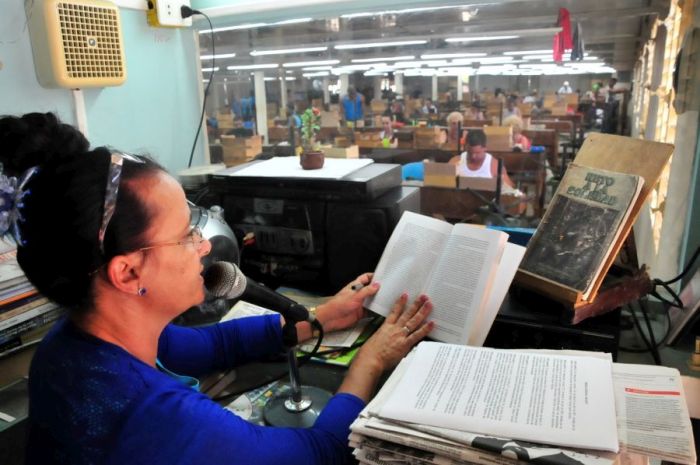 After almost 20 years reading for cigar factory workers, Carmen Álvarez Rodríguez reviews the motivations that made her stay in a job previously unknown to her
After almost 20 years reading for cigar factory workers, Carmen Álvarez Rodríguez reviews the motivations that made her stay in a job previously unknown to her
Although she liked the medicine career when she was young, she has become an expert in another field. His father was an avid reader of the History of Cuba. She also remembers her mother frequently reading books, magazines and newspapers despite of her age and health limitations.
For the first time in her life, Carmen Álvarez Rodríguez talks about the circumstances that led her to the small cabin where she learned to love the job of reading at the Alfredo López Brito cigar factory in the municipality of Cabaiguán.
As a teenager, you dreamed of becoming a doctor, ¿how was the adaptation to such a different job profile?
Actually, the motivation came later, when I began the practice. I used to be a cigar roller myself for eight years, but it was very difficult for me to meet the plans; on the other hand, I was the mother of a small child. One day, the reader position was vacant and, since I’ve always liked reading, I applied for it.
It is the factory workers who choose the readers. How was the selection process in your case?
The vacancy was announced for all the permanent employees who were interested. I was requested to read different materials for the audience. The tests lasted two weeks, after which the commission in charge heard the opinion of the workers and selected the reader they liked the most.
Cigar rollers are considered cultured people thanks to the work of people like you. Are they the ones who choose the readings?
The literary work must be chosen by them. They listened to the summary of some texts and vote for the best. (…) They must not be banal stories; they must contribute somehow to the knowledge of the people. Concerning the other readings (news and the special text) it is me who does the selection depending on the relevance of the topic.
Are readers supposed to dramatize the novels?
Before the triumph of the Revolution, the readers dramatized because they did not have the audio support and used other means instead. It’s not that we have to do it. In my case, I try to change the voice according to the characters, but do not use special effects.
Where do you get the books from?
We borrow the books from the local library, but the workers often contribute with books of their own.
How is reading time divided?
In the morning I read both national and international news.The literary works are read in the afternoon depending on the interest of the workers. Sometimes the radio is used to complement the reading time.
Your sister Idania is also a reader in the nearby Guayos cigar factory. How do you help each other?
Sometimes we share the books that we have read. When there is a commemoration we exchange ideas, so we constantly help each other.
The cigar factory reader was granted the title of cultural heritage of Cuba. What does it mean for you to be part of this heritage?
It is an acknowledgment to my work.Even in Cuba there are people who do not know what a cigar reader is.I did not know it myself as a child or as a young girl.Now the job is recognized by people and at institutional level.We hold meetings attended by the Tabacuba leadership, the union and well-known personalities of the Cuban culture.Cuba is the only country where this activity is carried out.
How do you see the future of the cigar factory reader?
The job has developed both economically and socially. There is more cultural recognition and I hope it continues to improve.The tradition of reading should never be lost.The readers must take care of our heritage so that it lasts 152 years more and will continue being a Cuban tradition.
How do you see the future of the cigar factory reader?
The job has developed both economically and socially. There is more cultural recognition and I hope it continues to improve.The tradition of reading should never be lost.The readers must take care of our heritage so that it lasts 152 years more and will continue being a Cuban tradition.
By Thalía Martín Gutiérrez- Estudiante, journalism student.
 Escambray ENGLISH EDITION
Escambray ENGLISH EDITION





Escambray reserves the right to publish comments.